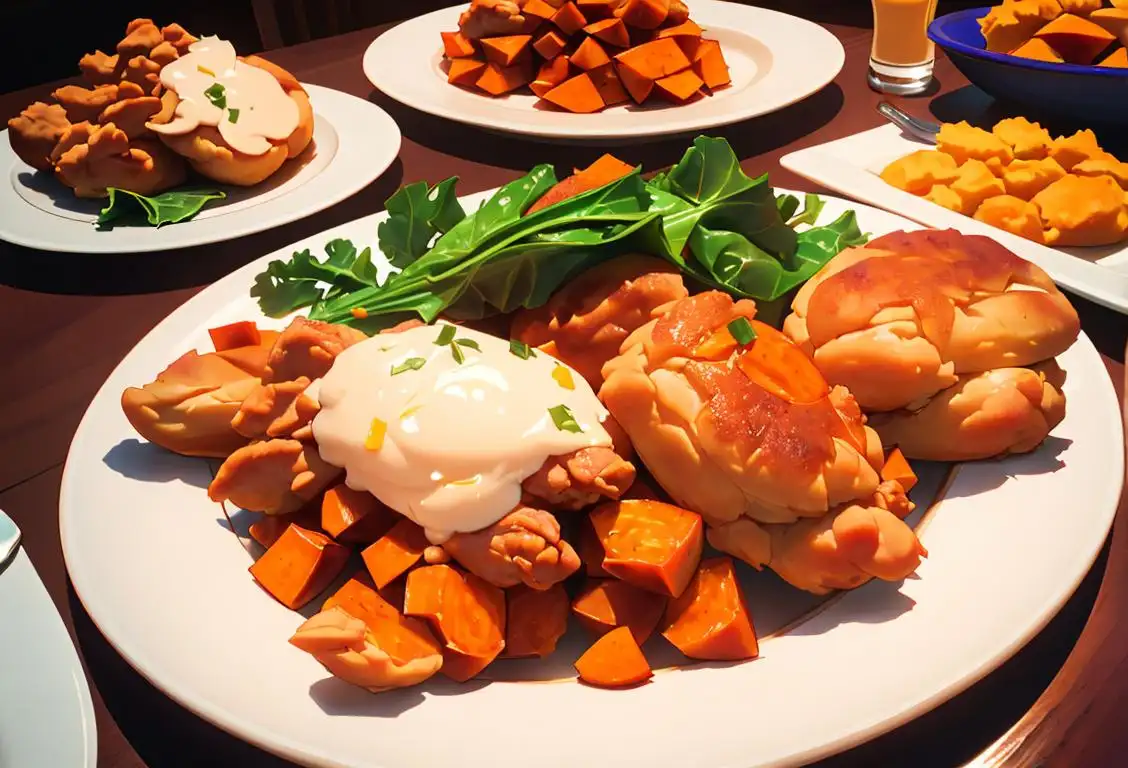National Southern Food Day

Get ready to indulge in some mouthwatering delicacies because it's National Southern Food Day! This delightful holiday celebrates the rich and flavorful cuisine of the American South. So gather your loved ones, put on your stretchy pants, and get ready to savor some soulful dishes that will warm your heart and fill your belly.
When is Southern Food Day?
It's national southern food day on the 22nd January.
The History of National Southern Food Day
Although the exact origins of National Southern Food Day are unclear, it is believed to have emerged from the collective love and admiration for the diverse culinary traditions of the American South. From soul food to Cajun cuisine, the South boasts an array of dishes that are as comforting as they are delicious.
The internet has played a significant role in popularizing National Southern Food Day, with foodies and enthusiasts sharing their favorite Southern recipes, restaurants, and cooking tips online. Social media platforms have been abuzz with hashtags like #SouthernFood, #FoodieFriday, and #ComfortFood, creating a virtual gathering of food enthusiasts celebrating the flavors of the South.
How to Celebrate National Southern Food Day
Celebrating National Southern Food Day is as easy as pie! Literally. Here are some fun and delicious ways you can join in on the celebration:
- Host a Southern-inspired potluck with friends and family, where everyone brings a classic Southern dish. Think fried chicken, collard greens, shrimp and grits, and, of course, pecan pie.
- Explore the vast world of Southern cuisine by trying out new recipes from different Southern states. From Texas barbecue to Louisiana gumbo, there's always something new and exciting to discover.
- Visit a Southern-style restaurant in your area and treat yourself to a flavorful meal. Don't forget to save room for some homemade peach cobbler!
- Organize a cooking competition with your friends, where each participant has to whip up their own twist on a classic Southern dish. May the best chef win!
- Take a virtual tour of iconic Southern food destinations. From Beale Street in Memphis to the French Quarter in New Orleans, there's plenty of foodie adventures awaiting.
The Southern Hospitality Spirit
Did you know that Southern hospitality is not just a saying but a way of life in the South? The warm and welcoming nature of Southerners extends beyond food and manifests in their kindness and generosity. So, while indulging in the delectable dishes of the South, don't forget to share the love and spread some Southern hospitality wherever you go!
History behind the term 'Southern Food'
1607
Colonial Influence
Southern food finds its roots in the early American colonies. In 1607, English settlers established the Jamestown colony in Virginia, introducing staple foods such as corn, squash, and beans. These crops, along with the use of pork and seafood, formed the foundation of Southern cuisine.
1607
Colonial Influence
Southern food traces its roots back to the early 17th century when English settlers, known as the Jamestown colonists, arrived in Virginia in 1607. These colonizers brought with them their traditional English recipes and cooking techniques, forming the foundation of what would later become Southern cuisine.
18th century
Early Roots in Native American Cuisine
Southern food has its roots in the diverse range of Native American cultures that inhabited the region for thousands of years. Native Americans cultivated various crops such as corn, beans, and squash, which became staple ingredients in Southern cooking. Additionally, they introduced unique cooking techniques like smoking and drying, which have had a lasting impact on Southern cuisine.
1700s
Influence of West African Cuisine
Throughout the 18th century, the slave trade brought countless West Africans to the Southern United States. The African influence on Southern food can be seen in the use of ingredients like okra, yams, black-eyed peas, and collard greens. African cooking techniques, such as seasoning with spices and slow-cooking, also became an integral part of Southern cuisine.
1700s
African Influence
During the 1700s, the Atlantic slave trade brought a significant number of African people to the Southern states. Enslaved Africans, skilled in their own culinary traditions, contributed greatly to the development of Southern food. They introduced techniques and flavors like stewing, frying, and the use of okra, peanuts, and various spices.
17th to 19th centuries
Influences of African Enslaved People
The arrival of African enslaved people in the Southern United States during the colonial period brought a significant culinary influence. African cooks brought with them their rich food traditions, which included a wide array of spices, rice cultivation techniques, and one-pot cooking methods. Their contributions greatly influenced the flavors and techniques of Southern cooking, leading to the creation of iconic dishes like gumbo and jambalaya.
1800s
Southern Hospitality and Plantations
In the 1800s, Southern food began to evolve due to the influence of plantation agriculture and the concept of Southern hospitality. Large plantations required substantial amounts of food to be prepared, leading to the development of traditional Southern dishes like fried chicken, grits, biscuits, and sweet tea. These foods were often served to guests as a symbol of hospitality.
Early 19th century
European Influences and the Rise of Plantation Cuisine
As slavery expanded and European settlers arrived in the South, Southern cuisine began incorporating European culinary traditions. Influences from countries like England, Scotland, Ireland, and France led to the development of dishes like fried chicken, biscuits, and various pastries. The wealthy plantation owners often employed French chefs, further enriching the culinary landscape of the region.
1800s
Incorporation of Native American Foods
During the 19th century, Native American influence on Southern food became increasingly prominent. The Native American tribes of the Southeast, such as the Choctaw, Cherokee, and Creek, contributed ingredients like corn, peanuts, and squash to the Southern culinary repertoire. Many classic Southern dishes, such as cornbread and succotash, have Native American origins.
Late 19th to early 20th centuries
Industrialization and the Modernization of Southern Food
The advent of industrialization and transportation infrastructure in the late 19th and early 20th centuries had a profound impact on Southern food culture. Canned goods, processed foods, and mass-produced ingredients made their way into Southern kitchens, altering traditional cooking methods. However, many rural communities and African American households maintained their culinary traditions and continued cooking from scratch using locally sourced ingredients.
Early 1900s
Industrialization and Urbanization
With the rise of industrialization and urbanization in the early 1900s, Southern food faced changes. Traditional agrarian practices gave way to modern farming methods, leading to a shift in the availability and types of ingredients used. Additionally, urbanization brought influences from other regions, resulting in a fusion of culinary traditions.
1800s
Plantation Era and French Influences
In the antebellum South, wealthy plantation owners heavily influenced Southern cuisine. French culinary techniques and flavors were introduced through the presence of talented French-trained enslaved chefs who worked in the plantation kitchens. These chefs infused Southern food with French influences, introducing dishes like jambalaya, gumbo, and beignets.
Late 19th Century
Post-Civil War Period and Comfort Foods
Following the Civil War, the South faced economic hardships and food scarcity. This led to the development of comfort foods that provided nourishment and warmth. Dishes like fried chicken, biscuits, and various forms of pie gained popularity and still hold a special place in Southern cuisine today.
Late 1900s
Revival of Southern Cuisine
In the late 1900s, there was a renewed interest in Southern cuisine. Chefs and food enthusiasts began celebrating the rich culinary heritage of the South, focusing on preserving and reviving classic Southern dishes. The rise of the farm-to-table movement also played a role, emphasizing the use of locally sourced ingredients and traditional cooking methods.
Mid-20th century to present
Southern Food Renaissance and Global Recognition
Starting in the mid-20th century, there was a renewed interest in preserving and celebrating Southern food traditions. Influential chefs, authors, and cultural historians began championing the unique flavors and techniques of Southern cooking, leading to a revival of interest in the cuisine. Today, Southern food has gained global recognition, with its signature dishes like fried chicken, barbecue, and shrimp and grits becoming beloved icons of American culinary heritage.
20th Century
Industrialization and Convenience Foods
With the rise of industrialization and mass production in the 20th century, convenience foods made their way into Southern kitchens. Canned vegetables, processed meats, and pre-packaged mixes became more accessible, altering the cooking landscape. However, despite these changes, traditional Southern recipes and cooking methods persisted, celebrated for their rich flavors and cultural significance.
Present
Modern Southern Food
Today, Southern food is celebrated throughout the United States and even internationally. It has become a distinct and highly regarded cuisine, known for its comforting flavors and bold combinations. From soul food to Cajun and Creole dishes, Southern food continues to evolve, blending its deep historical roots with contemporary culinary innovations.
Did you know?
Did you know that grits, a quintessential Southern dish, has its own festival? The 'World Grits Festival' is held annually in St. George, South Carolina, where people come together to celebrate this beloved Southern staple.Tagged
romance food fun loved onesFirst identified
22nd January 2016Most mentioned on
22nd January 2016Total mentions
416Other days
Family Day
One Day
Awareness Day
Kissing Fried Chicken Day
Opposite Day
Vodka Boyfriend Day
Action Day
Happiness Day
Suicide Prevention Month Day
Believe Day









